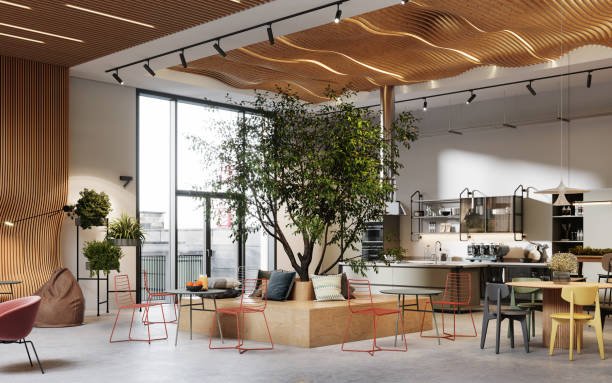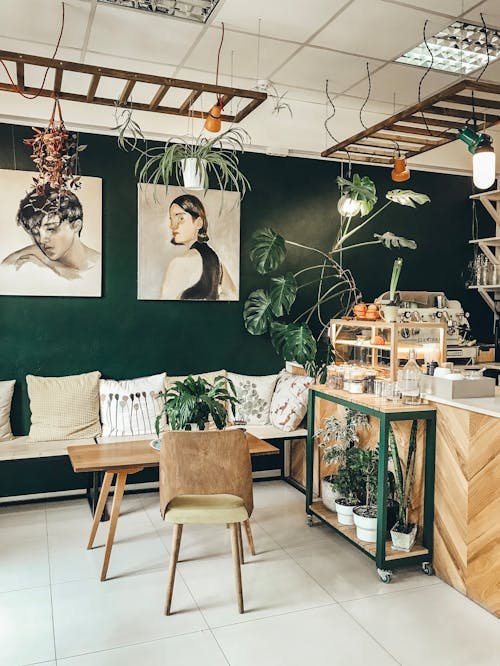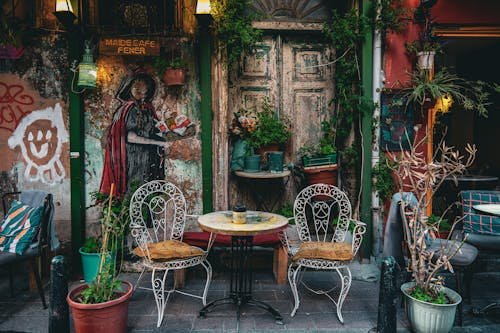From the pristine simplicity of a Scandinavian-inspired space to the bustling charm of an urban coffee house, the design of a cafe is a language of its own, expressing the heart and soul of the establishment. For cafe owners, creating an environment that not only serves as a gathering place but a canvas for customer experiences is crucial. Interior design enthusiasts revel in the innovation and artistry that manifests within these cafe walls, and for the nomadic traveler or local explorer, the design of a cafe often defines the cultural pulse of a city. In this blog post, we’re exploring how cafe design sets the stage for memorable engagements and shares inspirational insights for cafe owners, interior design aficionados, and the curious globetrotter.

Trends in Cafe Design
Cafe design, like any other form of interior design, is influenced by trends that shift with the cultural climate. Here are some of the latest movements shaping the aesthetics of cafes around the globe.
Sustainability in Design
Today, it’s not just about how a space looks, but also about how it makes the customer feel. Sustainability is a driving force in cafe design, with eco-friendly materials, energy-efficient lighting, and upcycled furniture becoming the norm rather than the exception. Green walls, which not only introduce a natural element but also improve air quality, are increasingly popular. Furthermore, the ‘zero-waste’ cafe concept is transforming not just the aesthetic but the operating principles of these spaces, creating a truly mindful experience for patrons.
Technology Integration
The modern cafe-goer is wired, and the best cafe designs integrate technology seamlessly. From integrated charging stations to smart ordering systems, technology is shaping the way we experience cafes. Some even incorporate elements of augmented reality for a unique, interactive customer experience.

The Power of Natural Light
Nothing sets the tone of a cafe like its lighting. Natural light, when used thoughtfully, can create a welcoming, rejuvenating space. Designers are leveraging large windows, skylights, and glass walls to make spaces feel open and bright, which can positively influence the mood of patrons. In addition, clever use of mirrors and reflective surfaces amplifies natural light, making even the smallest spaces feel airy and spacious.
Designing for Different Cafe Concepts
The design of a cafe should be a direct reflection of its unique concept and brand identity. Here’s how to tailor design choices to different types of cafes.
Urban Cafes
In the heart of a bustling city, where the pace is relentless, an urban cafe serves as a respite. The design should be functional, with a focus on maximizing space. Clean lines, multipurpose furniture, and an industrial aesthetic often complement the energy of city life.
Cozy Corners
For cafes targeting patrons seeking a retreat from the city, an emphasis on comfort and intimacy is key. Soft lighting, plush seating, and warm color palettes create a relaxed atmosphere that encourages patrons to linger over their favorite brew.

Themed Cafes
Themed cafes allow for an element of whimsy and storytelling. From literary themes, to pop culture, or historical eras, the decor should transport guests to a different world. This often involves focusing on specific design elements that are emblematic of the chosen theme, without overwhelming the space with too many details.
Case Studies and Inspirations
Design brilliance often isn’t in the grandeur, but in the details. Here are some case studies of cafes that have mastered the art of design to create unforgettable spaces.
The Loft, Athens, Greece
This cafe-bar is a multi-level space that manages to combine concrete, wood, and metal in a graceful dance of textures. Large, arched windows flood the space with natural light during the day, giving way to the soft glow of pendant lights in the evening.
The Grounds of Alexandria, Sydney, Australia
A former industrial precinct that has been embraced by the local community, The Grounds’ design is a testament to adaptive reuse. A vintage coffee cart, farm animals, and a verdant garden inside the glasshouse contribute to the romanticism of the space.
Café de l’Horloge, Avignon, France
Combining history with modern design, this French cafe integrates colorful, contemporary furniture within a centuries-old building. Its central location in the Place de l’Horloge makes it a prime spot for people watching.
Practical Advice for Cafe Owners
Creating a stunning cafe design can seem daunting, especially for owners with constrained budgets. However, with a bit of know-how, it’s possible to make a big impact without a big spend.
Sourcing Affordable Designs
Cafe owners don’t need to break the bank to create a stylish interior. By sourcing furniture and decor from local artisans, second-hand stores, or even from DIY projects, it is possible to find unique, budget-friendly pieces that tell a story and engage customers.
Layout and Flow
The layout of a cafe can significantly impact its design effectiveness. Consider the flow of traffic, the placement of service areas, and the opportunity for flexible spaces that can adapt to different events or customer needs throughout the day.
Brand Consistency
The design should be consistent with the cafe’s brand, creating a cohesive narrative that extends from the logo to the menu and the space itself. This ensures that customers understand and resonate with the story being told through the design.
The Intersection of Cafe Design and Travel
For travelers, cafes often provide a vivid snapshot of the local culture. Cities like Paris, Vienna, and Rome have long been renowned for their cafe cultures, where the ambiance is as important as the espresso.
A City’s Pulse
Cafe design plays a significant role in shaping the identity of a city. Whether it’s the minimalist cool of Scandinavia or the ornate elegance of Vienna, each city’s cafe designs are a living expression of its unique charm and character.
A Design-Centric Itinerary
When planning a trip, consider including some of the world’s most iconic cafes as stops on your itinerary. They not only offer a great cup of coffee but also a masterclass in design inspiration.
Share Your Discoveries
Your favorite cafe design could become someone else’s travel highlight or inspire another cafe owner’s next redesign project. Share your discoveries with fellow enthusiasts to continue the cycle of inspiration.
Conclusion
Cafe design is much more than just picking out colors and furniture; it’s a strategic narrative that shapes the customer experience, communicates brand identity, and often, becomes a landmark people travel the world to see. By keeping an eye on the latest trends, tailoring designs to different cafe concepts, learning from successful case studies, and applying practical advice, cafe owners can create spaces that are functional, beautiful, and above all, memorable. For patrons and explorers, the cafes we visit become a catalog of inspiring spaces that speak volumes about the world around us. The next time you sit down to savor a latte or immerse yourself in the hustle of a city, take a moment to appreciate the design that inspires so many. And who knows, maybe the next great cafe design is just around the corner, waiting to be discovered.






